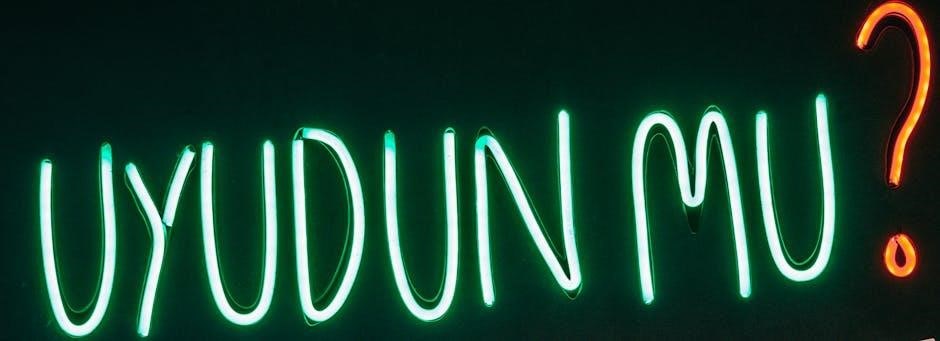Overview of Night Chapter 5
Night Chapter 5 explores the horrors of the Holocaust through Eliezer’s struggles during Yom Kippur. It highlights his internal conflict, the harsh camp conditions, and the erosion of faith, providing a poignant reflection on survival and spirituality.

Chapter 5 of Night depicts the harrowing experiences of Eliezer and other prisoners during Yom Kippur. The chapter focuses on the prisoners’ debate about fasting, symbolizing their spiritual struggle. Eliezer refuses to fast, reflecting his growing anger toward God. The Nazis’ brutal selection process looms, intensifying fear. Advice to appear strong and avoid selection is shared, highlighting survival instincts. The chapter captures the emotional and psychological toll of the Holocaust, emphasizing themes of faith, despair, and resilience amid unimaginable suffering.

Significance of Chapter 5 in the Context of the Book

Chapter 5 of Night is pivotal as it captures Eliezer’s spiritual and emotional turmoil during Yom Kippur in the concentration camp. His refusal to fast symbolizes his growing rebellion against God, reflecting the broader theme of faith crisis under extreme suffering. The chapter also underscores the harsh realities of the Holocaust, such as the selection process and the advice to survive by appearing strong. It serves as a turning point, deepening the exploration of humanity’s struggle to maintain dignity and belief in the face of unimaginable cruelty, making it central to the book’s message.

Key Questions from Night Chapter 5 PDF
- What Jewish event is taking place in Chapter 5?
- Why doesn’t Eliezer fast on Yom Kippur?
- What advice is given to Elie to pass the selection process?
What Jewish Event is Taking Place?
In Chapter 5 of Night, the Jewish event taking place is Yom Kippur, the Day of Atonement, one of the holiest days in the Jewish calendar. This event is significant as it represents a time for reflection, fasting, and seeking forgiveness. However, in the context of the concentration camp, the prisoners are deeply conflicted about observing the holiday. The debate among them highlights their internal struggle between maintaining their faith and confronting the harsh reality of their situation. This moment underscores the erosion of spiritual hope and the moral dilemmas faced by the prisoners.
Why Doesn’t Eliezer Fast on Yom Kippur?
Eliezer chooses not to fast on Yom Kippur in Chapter 5 of Night as a form of protest against the unimaginable suffering he and others endure in the concentration camp. Fasting, traditionally a sacred act of atonement, becomes meaningless in the face of such horrors. His decision reflects his growing anger and disillusionment with God, as he struggles to reconcile his faith with the cruelty and injustice around him. This act symbolizes his loss of spiritual connection and his inability to find solace in religious practices amidst the atrocities.
What Advice Was Elie Given to Pass the Selection Process?
In Chapter 5 of Night, Elie is advised to lie about his age to appear stronger and more capable of working. This counsel is crucial during the Nazi selection process, where prisoners were judged on their ability to labor. The advice emphasizes the importance of deception as a survival tactic in the harsh concentration camp environment. By following this guidance, Elie increases his chances of avoiding immediate death, highlighting the brutal reality of survival in the Holocaust.

Themes and Symbols in Chapter 5
Chapter 5 explores themes of spiritual decay and despair, with symbols like the muselmann representing the loss of humanity; Faith and hope are central to the narrative, reflecting the emotional and psychological turmoil of the prisoners amidst unimaginable suffering.
Loss of Faith and Spirituality
Chapter 5 of Night vividly portrays Eliezer’s internal struggle with faith amidst the horrors of the Holocaust. The decision not to fast on Yom Kippur symbolizes a rupture in spiritual connection, as Eliezer feels abandoned by God. The hanging of a young boy further intensifies his existential despair, questioning divine justice. The absence of hope and the prevalence of suffering lead to a collective spiritual decay, as prisoners grapple with the moral and ethical implications of their plight, reflecting the broader theme of faith’s erosion in the face of unimaginable atrocities.
The Concept of Hope and Despair
Chapter 5 of Night delves into the interplay between hope and despair, as prisoners face unimaginable suffering. The debate over fasting on Yom Kippur reflects a struggle to maintain hope through tradition, while others surrender to despair. The harsh realities of the camp, including brutal selections, intensify the emotional toll. Eliezer’s internal conflict mirrors the broader theme of clinging to hope amidst hopelessness, as the survivors’ will to endure is constantly tested by the cruel conditions and the erosion of their humanity.

Eliezer’s Internal Struggles
Eliezer’s internal struggles in Chapter 5 revolve around his loss of faith, anger toward God, and the instinct to survive, reflecting the broader Holocaust experience.
Anger Toward God vs. the Nazis
Eliezer’s anger in Chapter 5 is profoundly directed toward God, questioning His silence amidst unimaginable suffering, while his resentment toward the Nazis, though present, is overshadowed by his spiritual turmoil and disillusionment with divine justice.
Metaphorical Descriptions of Eliezer’s State
Eliezer describes himself as “ashes,” symbolizing his emotional and spiritual emptiness. This metaphor underscores his loss of faith and identity, reflecting the dehumanizing effects of the Holocaust. His state is depicted as weightless and useless, mirroring the hopelessness and despair pervasive in the camp environment, as revealed in the questions and discussions from the PDF.
Historical Context of Chapter 5

Chapter 5 occurs during the Holocaust, highlighting the Nazi regime’s brutal treatment of Jewish prisoners. The events surrounding Yom Kippur reflect the prisoners’ spiritual struggles amidst oppression and forced labor camps.
Events Surrounding Yom Kippur in the Book
During Yom Kippur, the prisoners debate whether to fast, reflecting their spiritual struggle. The holy day contrasts with the harsh camp reality, as the Nazis intensify selections. Eliezer, grappling with faith, decides not to fast, symbolizing his growing disillusionment. The chapter vividly portrays the emotional and physical toll on the prisoners, highlighting the oppressive environment and their internal conflicts during this sacred Jewish observance.
Impact of Nazi Policies on Jewish Prisoners
Nazi policies inflicted immense suffering on Jewish prisoners, forcing them into brutal labor, starvation, and constant fear of selection. The psychological toll was profound, as prisoners faced internal conflicts about faith and survival. The dehumanizing conditions and relentless oppression eroded hope, leaving many feeling abandoned and questioning divine justice. The policies aimed to strip identity and dignity, plunging prisoners into a despair that mirrored the physical horrors of their environment.
Guide to Answering Chapter 5 Questions
Analyze themes like faith and survival, understand historical context, and approach questions methodically to uncover deeper meanings in Eliezer’s experiences and emotions during the Holocaust.
How to Approach Critical Thinking Questions
Engage with the text by identifying key themes and motifs, such as faith, survival, and hope. Analyze Eliezer’s emotional and psychological state, considering the historical context of the Holocaust. Examine the moral dilemmas presented, like the decision to fast on Yom Kippur, and evaluate their significance. Use evidence from the chapter to support your answers, focusing on specific events and Eliezer’s internal struggles. This method ensures a deep understanding of the chapter’s emotional and thematic complexity.
Understanding the Relevance of Each Question
Each question in Chapter 5 is designed to explore key themes and events, such as Yom Kippur, faith, and survival. Questions about Eliezer’s choices, like fasting, reveal his internal struggles and the erosion of spirituality. Inquiries about advice for the selection process highlight the harsh realities of the camp. These questions encourage readers to connect personal experiences with broader themes, fostering a deeper understanding of the Holocaust’s emotional and moral complexities. Addressing them enhances both individual comprehension and classroom discussions.

Importance of Chapter 5 Questions
Chapter 5 questions enhance comprehension of Eliezer’s struggles, fostering deeper analysis of themes like faith and survival. They prepare students for discussions and essay writing effectively.
Enhancing Comprehension of the Book
Engaging with Chapter 5 questions deepens understanding of Eliezer’s journey, encouraging critical thinking about themes like faith, survival, and hope. These questions prompt readers to analyze key events, such as the Yom Kippur debate and the selection process, fostering a richer grasp of the narrative. By exploring Eliezer’s internal struggles and the historical context, students gain insight into the Holocaust’s emotional and psychological impact. This analytical approach prepares them for meaningful discussions and essays, enhancing their overall comprehension of the book’s profound themes and historical significance.
Preparing for Discussions and Essays
Answering Chapter 5 questions equips students with essential insights for engaging in meaningful discussions and crafting well-structured essays. These questions encourage critical thinking about key themes, such as faith and survival, and help analyze Eliezer’s emotional journey. By exploring his internal conflicts and the historical backdrop, students develop a deeper understanding of the Holocaust’s complexities. This preparation enables them to articulate thoughtful arguments and participate confidently in class debates or written assignments, fostering a more nuanced grasp of the novel’s profound messages and historical significance.
Chapter 5 of Night profoundly explores themes of faith, hope, and survival, offering critical insights into Eliezer’s journey. The questions and answers guide deepen understanding of the Holocaust’s impact.
Final Thoughts on Chapter 5 Questions
Engaging with Chapter 5 questions enhances comprehension of Eliezer’s spiritual and emotional turmoil. These inquiries prompt reflection on faith, survival, and the Holocaust’s atrocities, fostering deeper analysis and empathy. They also prepare students for discussions and essays by clarifying key themes and symbols, such as the loss of faith and the struggle to maintain hope amidst despair. Answering these questions encourages critical thinking and a nuanced understanding of Wiesel’s narrative, making them essential for a thorough study of Night.
